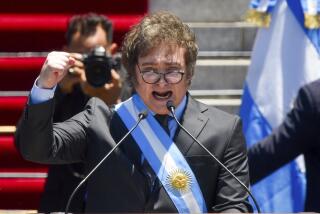Peronists Now Must Face Argentina’s Economic Ills
- Share via
BUENOS AIRES — The party created by Juan D. Peron in the mid-1940s, which won every Argentine election it was allowed to contest until its drubbing in 1983, has put to rest doubts that Peronism would be able to outlive its charismatic founder.
Invoking the memory of Peron and his famous wife Evita, populist Carlos Saul Menem stormed to a stunning victory in the presidential election Sunday. He thus capitalized on disgust with the failure of the ruling Radical Civil Union to arrest Argentina’s economic decline.
Menem now must prove that the Peronist party, which originally won over the working class with doses of state largess more than four decades ago, can cope with an economic crisis that frustrated the century-old Radicals of President Raul Alfonsin.
Menem, a 58-year-old attorney and the governor of La Rioja province, received 47.4% of the vote Sunday compared with 37% for Eduardo Cesar Angeloz of the Radical party, the Interior Ministry reported. That margin gave Menem 310 of the 600 presidential electors, nine more than necessary for election. The balance of the vote was split among the conservative Center Alliance and minor candidates.
The Justicialist Party, as the Peronists are formally known, also swept into control of the lower house of Congress. The party already holds the Senate, so Menem will have a supporting Congress when he takes office Dec. 10.
Many saw the result of Sunday’s election less as a vote for Menem than as a vote against the Radicals.
“It’s a withering indictment of the Radicals’ economic performance,” a Western diplomat said. “I think most people weren’t happy with the choices, but a lot of people decided to vote Peronist on the basis that the Radicals were doing nothing. They just shrugged their shoulders and said, ‘It can’t get any worse.’ ”
Soaring Inflation
Inflation soared to 40% for the month of April--an annual rate projected at up to 3,000%. The currency, the austral, has lost 80% of its value against the dollar since February.
When Alfonsin defeated the divided, disorganized Peronists in 1983 in the first open election since Peron’s death nearly a decade earlier, many Argentines thought Peronism was fading. Many saw the party’s earlier allure as a matter of forbidden fruit: Military governments had banned Peronism for a total of 18 years after 1955.
But Alfonsin’s win over Peronist presidential candidate Italo Luder brought to the forefront of the Peronists a group of so-called renovadores (renewers), including Menem, who successfully fought for democratic reforms within the party. This paid off with impressive Peronist victories in provincial and congressional elections in 1987.
Menem won the Peronists’ presidential nomination in the party’s first open primary, although some critics have said that he did so with the help of remnants of the old Peronist order who had lost out in the reorganization.
Menem insists he owes no political debts, not even to the powerful General Confederation of Labor which unleashed its machine on his behalf. The union’s leaders, including Secretary General Saul Ubaldini, have said they do not expect Menem to produce miracles overnight.
Some analysts suggest that Menem’s strong ties with organized labor will help him win its cooperation for potentially painful measures, such as cutbacks in the public work force to trim a huge deficit. Alfonsin was plagued by 13 general strikes, and he met labor intransigence when he tried to privatize state enterprises.
More to Read
Sign up for Essential California
The most important California stories and recommendations in your inbox every morning.
You may occasionally receive promotional content from the Los Angeles Times.













